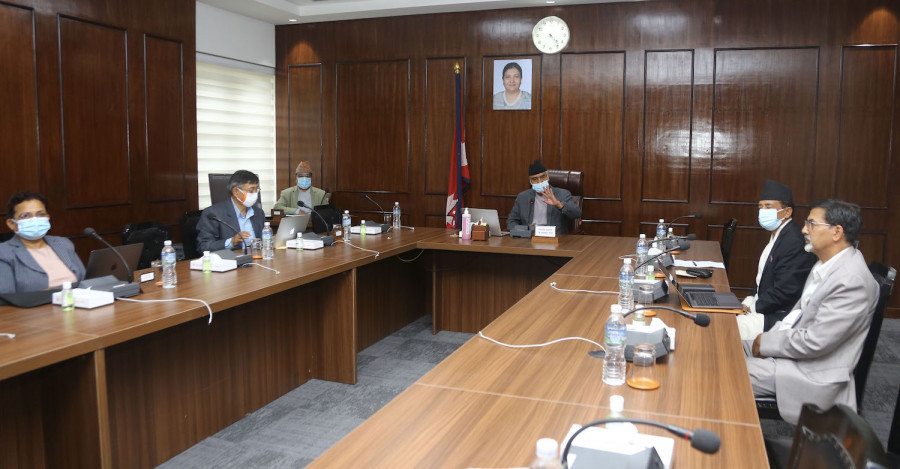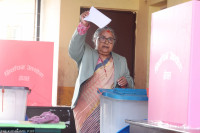Politics
Maoists mulls mechanism to ‘help’ its ministers
But experts think such a mechanism could straitjacket ministers, promote corruption.
Tika R Pradhan
The Communist Party of Nepal (Maoist Centre), which is a major partner in the Sher Bahadur Deuba-led coalition, is preparing to form a mechanism purportedly to help its ministers perform better.
Chairman Pushpa Kamal Dahal, during the party’s Standing Committee meeting that started on Monday, has proposed a mechanism to provide the five ministers from his party with necessary feedback besides monitoring and evaluating their works.
“Chairman Dahal has proposed forming a mechanism and it could be formed soon after discussion at the ongoing Standing Committee meeting of the party,” said Ganesh Sah, a Standing Committee member. “Dahal has proposed forming a three to five member mechanism to ensure that our ministers perform well during this term and this would be helpful for the upcoming polls.”
Earlier, when Dahal co-chaired the Nepal Communist Party (NCP), his proposal to form an all-party mechanism to “support” the then KP Sharma Oli-led government was rejected by his own party leaders saying that the move is not supported by constitutional provisions.
Recently, when the party was preparing to join the government, Dahal’s close aide and former minister Haribol Gajurel had demanded that he should lead the party’s team in the government. That way, he would bring people-centric programmes with focus on the elections.
However, he was not sent to the government.
Maoist Centre has six ministers—Pampha Bhusal (Energy), Janardan Sharma (Finance), Devendra Poudel (Education), Sashi Shrestha (Land Management), Maheshwar Jung Gahatraj (Youth and Sports) and Bodhmaya Kumari Yadav (Minister of State for Education).
Following the Supreme Court’s decision in March to nullify the unification between the CPN-UML and the CPN (Maoist Centre), the Maoists have found themselves in an electorally weaker position as the CPN-UML has a larger voter base. So the party has been discussing ways to improve election performance through better public service while in the government.
“Forming such a mechanism is not a new practice in our party as it will help guide the new ministers to perform better,” said Pampha Bhusal, a Standing Committee member and minister.
But some leaders and ministers in the Deuba government believe that such a mechanism is not necessary as the ministers regularly brief their top leaders and receive instructions. They even believe such a mechanism could prevent the ministers from thinking and working freely.
“I don’t think such a mechanism would be necessary as ministers always consult the party before taking crucial decisions,” said Birodh Khatiwada, who leads the CPN (Unified Socialist) in the government. “Party should provide necessary suggestions and we should listen to the party.”
He said the immediate past government could not function properly and collapsed because of unilateral decision making by then prime minister KP Sharma Oli.
The meeting also discussed an overdue joint mechanism of the five-party alliance to guide the government.
“The five-party alliance has already agreed to form a mechanism to support the government,” said Girirajmani Pokhrel, a Standing Committee member of the Maoist Centre and former minister. “Now that the government has got its full shape, the leaders will resume discussion on the issue.”
Political analysts, however, have said forming such a mechanism means watching the ministers’ actions, which would ultimately create pressure on the prime minister.
“Forming a political mechanism to guide the ministers would only tighten the party’s control on them. If the parties really want to support their ministers, then they should rather form a team of experts,” said Rajendra Maharjan, a political analyst. “Such mechanisms, besides controlling the works of the ministers, could also promote corruption to benefit the parties.”
According to Maharjan, Nepali ministers are in dire need of advisers and subject experts to help them make better decisions or else ministers could be swayed by ‘crooked’ civil servants and corrupt middlemen.
Another political analyst Mrigendra Bahadur Karki said parties in the coalition could use such a mechanism to create additional pressure on the prime minister and even straitjacket him.
“I think such a mechanism would go against the values of liberal democracy,” said Karki, the executive director at the Centre for Nepal and Asian Studies. “It is also against the prime ministerial system of governance.”




 27.41°C Kathmandu
27.41°C Kathmandu













